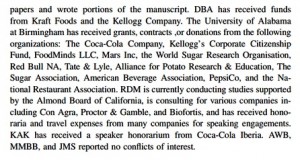Independently funded study by Industry-funded authors finds sugary drinks to increase the risk of hypertension. The score: 70:6.
Do sugar-sweetened beverages increase the risk of high blood pressure?
Yes, says this study, which was conducted by investigators who accept research funding from Coca-Cola and the Calorie Control Council (a trade association for companies that make or use artificial sweeteners). But the study itself was funded by independent government agencies or health associations in Canada.
I’m counting it in the category of studies with results unfavorable to the food industry sponsors.
This brings the score to 70 industry-funded studies since mid-March with results favorable to the sponsor, to 6 with unfavorable results.
Sugar-sweetened beverage consumption and incident hypertension: a systematic review and meta-analysis of prospective cohorts. Viranda H Jayalath, Russell J de Souza, Vanessa Ha, Arash Mirrahimi, Sonia Blanco-Mejia, Marco Di Buono, Alexandra L Jenkins, Lawrence A Leiter, Thomas MS Wolever, Joseph Beyene, Cyril WC Kendall, David JA Jenkins, and John L Sievenpiper. Am J Clin Nutr 2015; 102:914-921 doi:10.3945/ajcn.115.107243.
- Conclusions: SSBs were associated with a modest risk of developing hypertension in 6 cohorts. There is a need for high-quality randomized trials to assess the role of SSBs in the development of hypertension and its complications.
- Funding: “The Canadian Institutes of Health Research…through the Canada-wide Human Nutrition Trialists’ Network and by the Diet, Digestive Tract, and Disease (3D) Centre, which is funded through the Canada Foundation for Innovation. The Ministry of Research and Innovation’s Ontario Research Fund provided the infrastructure for the conduct of this project.” Some of the investigators also received funds from Canadian government agencies or health associations.
- Authors’ funding disclosures: RJdS has received research support from the Calorie Control Council and the Coca-Cola Company…ALJ is a part owner, vice president, and director of research of Glycemic Index Laboratories, Toronto, Canada….JB has received research support from the Calorie Control Council and The Coca-Cola Company…CWCK has received research support from the Calorie Control Council, the Coca-Cola Company (investigator initiated, unrestricted grant), Hain Celestial, Kellogg, Kraft, Loblaw Companies Ltd., Solae, and Unilever…DJAJ has received research grants from Loblaw Companies Ltd., Unilever, the Coca-Cola Company… JLS has received research support from the Calorie Control Council and the Coca-Cola Company…travel funding, speaker fees, or honoraria from the Calorie Control Council, the Canadian Sugar Institute, World Sugar Research Organization, White Wave Foods, Abbott Laboratories, Dairy Farmers of Canada, Dr. Pepper Snapple Group, The Coca-Cola Company, and the Corn Refiners Association….
Comment
This is an exception that proves the rule. In this study, a group of investigators, some—but not all— of whom typically receive funding from food companies, participated in a study funded by Canadian government and health agencies.
One possible explanation is that when investigators typically funded by soda companies are funded independently, they design and conduct independent research.
If nothing else, this study is evidence for the need for and value of independent funding of nutrition research.



